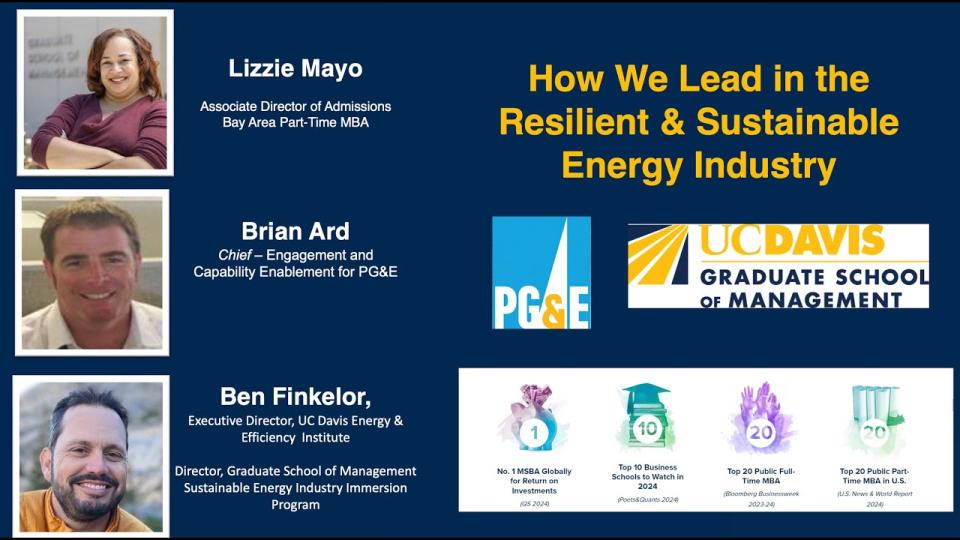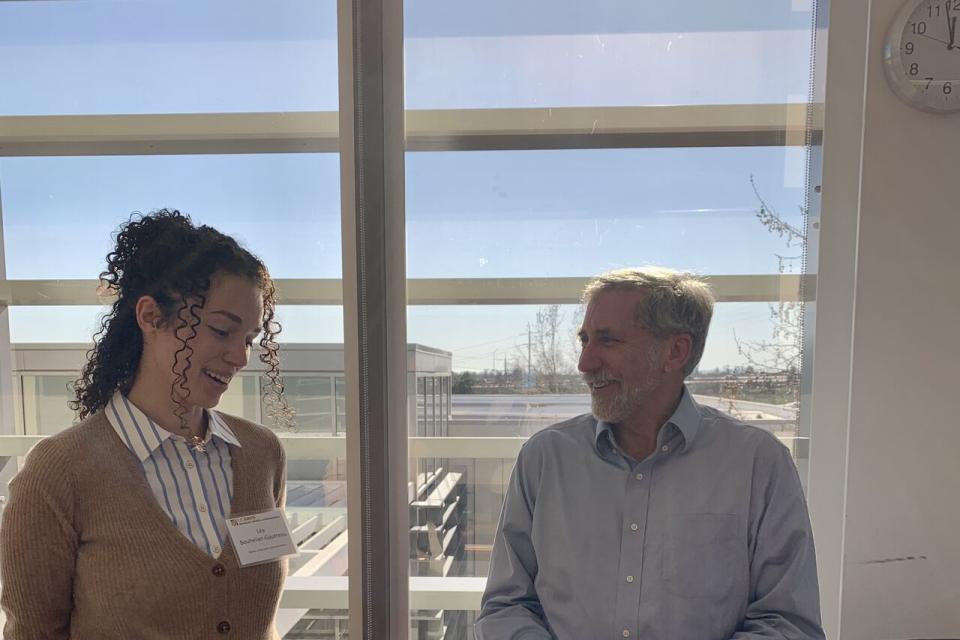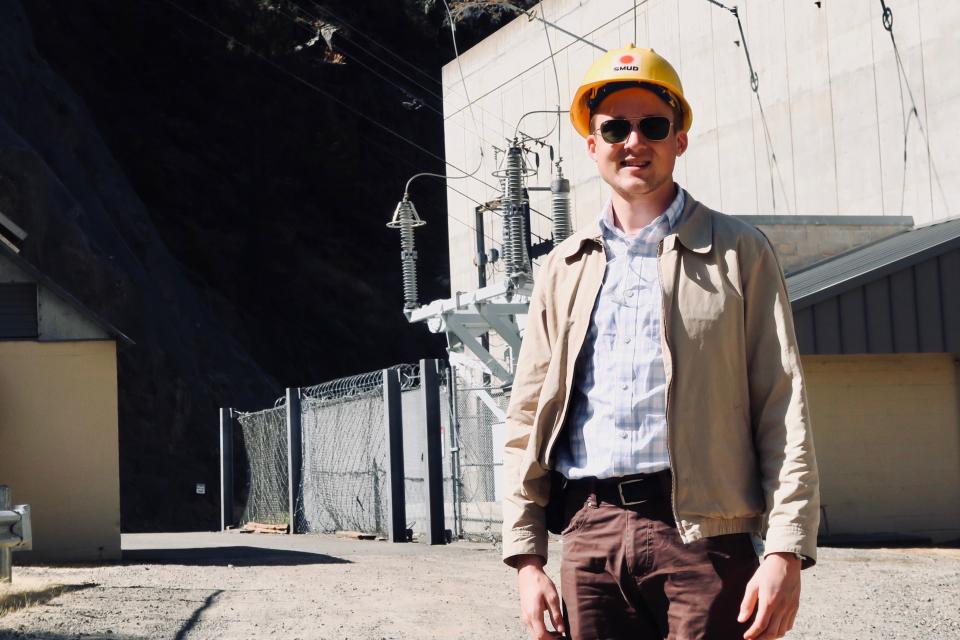UC Davis and PG&E: How We Lead in the Resilient and Sustainable Energy Field
Sustainable Energy Industry Immersion

Check out this virtual panel featuring PG&E's Chief of Engagement and Capability Enablement Brian Ard, and UC Davis MBA alumnus and lecturer Ben Finkelor, executive director of the UC Davis Energy Efficiency Institute.
They discuss leadership in the resilient and sustainable energy industry.
Finkelor also highlights our UC Davis Sustainable Energy Industry Immersion, which he directs.
Learn more about our nationally ranked MBA programs and our interdisciplinary, immersive Immersion experiences that spans your entire MBA journey, leveraging UC Davis' strength as a research powerhouse and far-reaching corporate partnership network.
Transcript
Lizzie Mayo, Associate Director of Admissions, Bay Area Part-Time MBA
Welcome, everyone. My name is Lizzie Mayo, and I am an associate director of admissions for the Bay Area Part-Time MBA program. I will be your host today, and I’m delighted that you could join us for tonight’s event.
I would like to extend a warm welcome to our colleagues from PG&E and the UC Davis Graduate School of Management communities. I’m joined tonight by Brian Ard, chief of engagement and capability enablement for the enterprise change organization at PG&E. Brian has been with the company for the past 15 years and is also an Aggie, having earned his undergraduate degree in organizational studies from UC Davis.
I am also joined by UC Davis MBA alumnus Ben Finkler, executive director of the UC Davis Energy and Efficiency Institute and director of the Sustainable Energy Industry Immersion Program at the Graduate School of Management.
Without further ado, let’s begin tonight’s presentation with Brian.
Brian Ard, PG&E's Chief of Engagement and Capability Enablement
Hello, everybody. I can't tell you how excited I am to be here with you all today. If we could go back to the previous slide for a moment, Lizzie, I'd like to acknowledge that my picture doesn’t quite capture my current look. This is a product of the COVID era, and I’ve received such positive feedback that I’ve kept it. I’ve been with PG&E for 15 years, and for those interested in pursuing a career in resilient, sustainable energy, I’ve found my calling in the utility industry. I hope you will consider it.
I’d also like to share that my time at UC Davis was transformative. I graduated in 1992, and while Lizzie was kind enough not to mention it, I struggled a bit during my first quarter. However, I fell in love with the place and still think very fondly of it. If you have any questions, please reach out to me; I'd be happy to talk about it.
Now, let’s advance to the next slide.
Tonight, we’ll discuss creating a resilient energy industry and the type of leadership needed to drive innovation and excitement. You might have heard of David Marquet and his book, "Turn the Ship Around." He presents a leadership perspective focused on embedding greatness within people and practices, rather than relying solely on the leader’s personality. An organization should not be so dependent on its leader that it cannot function without them. Our role is to build greatness in others.
Let's advance the slide, Lizzie.
Before we continue, I want to emphasize the need for a shift in leadership style to build a resilient energy future. I work with and coach many leaders, and I often use a cartoon that illustrates the difference between wanting change and being willing to change. Many leaders are reluctant to embrace change, but it’s essential for creating a resilient industry.
Let’s advance to the next slide, Lizzie.
With over 30 years of experience working for major corporations like UPS, Allstate Insurance, Agilent, and Hewlett-Packard, and the last 15 years at PG&E, I’ve seen various leadership styles. Historically, leadership was about control and attracting followers, but today’s competitive environment requires a different approach. In a world where people have choices, especially with the rise of remote work, effective leadership is about creating an environment where people connect to their purpose and the organization’s purpose. This necessitates moving away from top-down control to fostering future leaders.
Please advance the slide, Lizzie.
I’ve found that mastering different leadership styles is crucial. There are six leadership styles, two of which are negative in the context of creating a positive work environment. While the coercive and pace-setting styles have their place, particularly in times of crisis like bankruptcy, effective leaders focus on the four positive styles. These include visionary leadership, which inspires and shapes the future.
Let’s advance the slide, Lizzie.
I won’t go into too much detail on this slide, but I want to highlight the shift from formal authority to moral authority. As a servant leader, you focus on empowerment, sacrifice, and embracing feedback. It’s about seeing the potential in others and helping them realize their greatness. This approach is essential for building a positive and effective work environment.
Advance the slide, Lizzie.
Servant leadership includes six styles, but I want to focus on the four positive ones. Leaders who can flex across these styles—especially the positive ones—create environments where people can achieve greatness. The two negative styles, while necessary at times, should be used sparingly.
Advance the slide, Lizzie.
Emotional intelligence is key to effective leadership. Daniel Goleman’s work on emotional intelligence shows that the higher you rise in an organization, the more crucial emotional intelligence becomes. It includes self-awareness, social awareness, and the ability to manage emotions effectively.
Let’s advance the slide, Lizzie.
Stephen Covey’s concept of Trust and Inspire leadership blends well with servant leadership. It emphasizes modeling the right behaviors, building trust, and inspiring people by connecting them to the organization’s purpose. At PG&E, our purpose is to deliver for our hometowns, serve the planet, and lead with love. Connecting people to this purpose helps them go the extra mile and align with our mission.
Advance the slide, Lizzie.
The top element of Trust and Inspire leadership is recognizing that all people have greatness within them. Our role as leaders is to unleash this potential and not control them. Creating an environment where people can grow and excel is our primary job.
That’s all I have for now. We have some time for Q&A at the end. Thank you for listening to my perspectives on leadership and how it ties into building a resilient energy future. I’ll now turn it back over to Lizzie.
Great thank you, Brian. We really appreciate your presentation and your partnership. I would like to turn over the presentation to Ben Finkler who will speak about The Graduate School of Management Sustainable Energy Industry Immersion program and the UC Davis Energy and Efficiency Institute.
Ben Finkler, Executive Director of the UC Davis Energy Efficiency Institute
Yeah, happy to be here. Thanks, Lizzie, for the introduction.
It’s fun to go right after Brian here and echo his thoughts. I’m also an Aggie through and through; I bleed blue and gold. I got my undergrad from UC San Diego, so I bleed their blue and gold too—good colors, UC colors. I have a certificate of corporate environmental management from UC Santa Barbara, but I got my MBA from UC Davis, and I’ve worked here for about 20 years, since I got my degree in 2004. So yeah, bleed blue and gold. I’m also a big fan of PG&E, and we have the same colors, Brian. It all works out.
I’m super thrilled and honored to chat with you today on this important topic. I earned my chops at UC Davis and got well-prepared for my current role leading the Energy and Efficiency Institute, which has grown from a center. I also have the honor of leading the industrial immersion program for sustainable energy. There are three immersion programs in these topic areas: sustainable energy, food and agriculture, and biotech. These programs leverage the existing expertise and world leadership of the UC Davis campus.
For those of you who don’t know, we’re the No. 1 ag school in the country. We compete regularly for that honor with Cornell, usually going one and two, but we often rank No. 1. We also compete with Wageningen University in the Netherlands, where we usually rank one or two. I mention this because we have a leadership position in the space. The MBA program, under current leadership, thoughtfully rolled out these industry immersion programs, which combine our campus’s strengths in technology solutions with business acumen to drive impact and solutions in the marketplace.
These programs offer 10 weeks of interactive classes taught by people like me. I lead the sustainable energy industry immersion program, and I’ve had executives from PG&E, Wells Fargo, and various investors and startups come and teach the class. They present real business cases and challenges they face, like rolling out heat pumps to six million households in California. These challenges often involve energy, business, organizational management, marketing, and financial problems. Our MBA students work side by side with master’s and PhD students in these areas of expertise, addressing real-world challenges posed by industry executives.
I teach the energy immersion program, but we also have programs in food and agriculture and biotech, leveraging our vet med program and med program in Sacramento. These sectors often intersect, like how bioresources from the food and ag sector can serve as energy resources. For example, Coca-Cola uses a lot of energy and is interested in saving energy while providing nutritional products leveraging the latest technologies.
These industry immersion programs are something I’m excited about. My job is to invite executives to facilitate case studies, presenting real-world challenges to the students, who then work together to devise solutions.
Next slide, Lizzie.
I’ll talk about the Institute I’ve been running for the past 18 years. It started as a center and now offers graduate degrees in Energy Systems, providing opportunities for students studying energy to be paired with MBA students interested in the energy sector. These immersion programs offer experiential learning through real-world research projects, driving impact in communities. This involves getting hands-on experience, like working with communities to understand the adoption of technologies like heat pumps.
Next slide, please.
We have several research areas of expertise. For instance, our Lighting Technology Center, co-founded by PG&E, has been instrumental in advancing LED technology. Our center collaborates with utilities running incentive programs to roll out these technologies, requiring new approaches to the traditional utility business model.
Our Lighting Center also works on virtual energy management, building controls, and electric vehicle and battery charging, interacting with the grid on a distributed scale. Another center focuses on the water-energy nexus, highlighting the energy used in water systems. For instance, every gallon of water used involves energy for pumping, heating, and treatment. Saving water saves energy, which can be just as valuable as the water itself.
So this is something that we've realized, and we've developed a whole set of research areas in this space, working with different leading water utilities and, of course, electric utilities.
The next slide you'll see we also work on HVAC. I mentioned heat pumps are a big deal. Most new houses in California will have heat pumps installed, but a heat pump is essentially what's in your refrigerator—it moves heat from one place to another. Currently, our air conditioners and heaters are separate; we use a boiler, usually natural gas, to heat water and our space, and an air conditioner for cooling.
A heat pump works like an air conditioner but can run in reverse, providing both heating and cooling efficiently. As we try to decarbonize our economy, we aim to electrify various applications, much like with vehicles, and heat pumps are a significant part of this effort. We also work on indoor air quality and other HVAC technologies.
There’s one more slide about our graduate group. These students work closely with MBA students in classrooms, learning from executives in the industry immersion program and from each other. This creates lifelong networks and resources. We just had our 20-year reunion for the business school, and it’s great to have a network you can rely on.
That’s my last slide. I’ll pass it back to Lizzie.
Lizzie Mayo, Associate Director of Admissions, Bay Area Part-Time MBA
Thank you, Ben. I appreciate that, and thank you for giving us insights into the great work being done across the UC Davis campus and the Graduate School of Management.
I'd like to shift the conversation now to the programs that make up the GSM. I’m going to let the students tell that story for us.
From the video, you can see we have various programs within the GSM. Options designed for working professionals include our Part-Time MBA programs in Sacramento and San Ramon, and our Online MBA platform. The curriculum is designed to be completed in two years, but you have up to four years.
In-person cohorts have classes twice a week after 5:00 p.m. over Zoom, and every other Saturday in person, providing a predictable work-life balance and FaceTime with classmates and faculty. During Saturday sessions, we provide breakfast, lunch, and plenty of caffeine to get you through your day. Networking is a significant opportunity in your MBA experience. Our delivery format allows you to get to know your classmates, participate in student clubs, and work on group projects.
The Online MBA has live class sessions twice a week after 5:00 p.m. over Zoom, with in-person components fulfilled by two required long weekend residentials in California. Most course content is provided as pre-recorded content to explore at your convenience. Regardless of the program, we believe in one MBA experience, allowing students to cross-register across platforms to expand their network. Core classes must be taken at your home campus, but elective classes can be taken at any campus, giving students access to industry immersions conducted at the Davis campus.
One of the top reasons to pursue your MBA is personal and professional growth that work experience alone can’t provide. Current students find value in gaining self-empowerment, confidence for future roles, career switches, new passions, purpose, and higher earning potential. Our curriculum is industry-focused, allowing students to work on pressing business challenges posed by top companies and startups through case studies and opportunities to engage with business professionals from across industries. You'll learn from globally ranked faculty committed to your success and development as professionals. You'll benefit from receiving knowledge ahead of its publication in scholarly journals, putting you well ahead of the curve.
Building leadership capacity through our pioneering collaborative leadership program, modeled on approaches used by global companies for their executives, you’ll have opportunities to collaborate with classmates, faculty, alumni, and executives from around the world, challenging you to be your best self. You’ll increase your marketability and maximize ROI throughout your career journey. UC Davis Graduate School of Management welcomes applicants from all military branches and their spouses.
UC Davis GSM students with military service excel inside and outside the classroom. Business schools and employers value your leadership skills, project management experience, team building, operations, and confidence to execute in high-pressure, real-world situations.
At the GSM, faculty provide real-world connections to the knowledge taught through group projects, case studies, and activities. Students apply their knowledge through practical experiences. During your time in the program, you will gain foundational knowledge in business and management and collaborate with industry leaders, like Brian and Ben, helping you grow into the best version of yourself.
I hope the video gave you a firsthand understanding of why students join the GSM community: collaboration. We foster a culture that inspires, transforms, and empowers individuals to be collective leaders committed to making a positive impact. Our collaborative leadership program pairs you with a senior industry leader as your mentor, honing your collaborative leadership skills through team projects. You will connect with top CEOs and global company leaders through fireside chats and be encouraged to lead student organizations. We also offer workshops diving into the collaborative leadership pillars and how to practice them.
On the screen, you can see the four pillars of our collaborative leadership program: inspire others to achieve, help others succeed, build trust and positive energy, and learn from others. These values align with what Brian mentioned in his presentation.
Ben reviewed the industry immersion program. Another way to customize your MBA electives is through self-guided concentrations: marketing, entrepreneurship and innovation, technology management, strategy, organizational behavior, business analytics and technologies, finance and accounting, and general management. These curated class lists allow you to focus on areas aligning with your job function and career goals. You can combine classes to customize your experience, like combining marketing with business analytics or general management with organizational behavior if you're in HR.
Our capstone course sharpens your writing, speaking, and critical thinking abilities through a 10-week team project. Projects come from partner companies, ranging from Fortune 500 firms to Silicon Valley startups, addressing real-time issues by creatively responding to business challenges. This deepens your analytical, technical, and leadership skills.
Our career development team offers one-on-one coaching, career fairs, information sessions, industry and business function panels, alumni connections, and practical job search strategies and skill-building.
Finally, I invite you to experience our dynamic community by attending a class visit. Come see the Davis difference, meet our students and faculty, and explore what format works best for you. Thank you again to our speakers.


